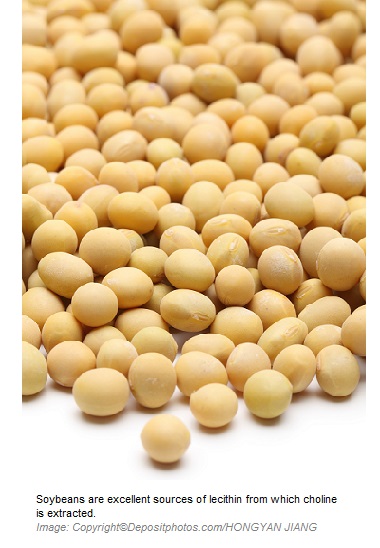 Since all the numbers of the vitamin B family have been already taken, we, at the Canadian Academy of Sports Nutrition, have named choline as the “vitamin B18” for the first time.
Since all the numbers of the vitamin B family have been already taken, we, at the Canadian Academy of Sports Nutrition, have named choline as the “vitamin B18” for the first time.
Being referred to as a “lipotropic agent”, choline is considered a “conditionally essential” nutrient in that de novo synthesis occurs in the liver.
Functions of Choline:
- It is a precursor for acetylcholine, phospholipids, and betaine.
- It is required for the metabolism of fat and cholesterol.
- It is necessary for the integrity of cell membranes and transmembrane signaling.
- It helps with utilization of fats in the body (lipotropic).
- It has an important role in detoxification system.
- It is vital for the myelin sheaths of the nerves and normal function of the liver and gallbladder.
Food Sources and Absorption:
The highest amount of choline is found in phosphatidylcholine (lecithin), which is usually extracted from soybeans. Other food sources are brewer`s yeast, wheat germ, egg yolk, organ meats, flaxseeds, sesame seeds, and peanuts. Small amounts can be found in potatoes, lentils, cauliflowers, and oats. This vitamin is manufactured by the liver as well.
Choline is absorbed well from the small intestine and can easily cross the blood – brain barrier into the spinal fluid and brain wherein is used to produce the neurotransmitter acetylcholine.
Athletic Benefits of Choline:
Heavy exercise and intense training lower the levels of choline in the body. Being claimed as a sport ergogenic aid, choline may demonstrate the following athletic benefits:
- It may improve exercise recovery.
- It may enhance mental acuity.
- It may increase endurance performance.
- It may prevent from post – exercise muscle damage (rhobdomyolysis). See “Post – Exercise Rhabdomyolysis” under the section of “Athletic Disorders”.
- It may diminish exercise – induced fatigue.
Non – Athletic Benefits of Choline:
Choline may be beneficial in the following conditions:
- Fatty liver.
- Liver cirrhosis.
- High cholesterol levels.
- High homocysteine levels.
- Alzheimer’s disease.
- Dementias.
- Tardive dyskinesia.
- Asthma.
- Prevention of neural tube defects.
- Multiple sclerosis.
- Parkinson`s disease.
- Bipolar disorder.
- Glaucoma.
- Tinnitus.
- Hypoglycemia.
Choline Deficiency:
Choline deficiency results in a wide range of health concerns, such as fatty liver, elevated liver enzymes, skeletal muscle damage with elevated levels of creatine phosphokinase, and fatigue. It has been also linked to insomnia, high levels of homocysteine, and heart diseases.
Dosage and Side Effects:
The recommended adequate intakes of choline for men and women are 550 mg per day and 425 mg per day, respectively. The PDI (performance daily intake) of choline for athletes and physically active men and women is 600 – 1200 mg a day. The upper limit for choline has been set at 3500 mg a day.
Choline is available either as 250 mg, 500 mg, and 1000 mg and usually combined with inositol (vitamin B8) or as lecithin at 1200 mg. One pill of lecithin provides about 50 mg of choline.
Larger doses of choline may cause stomach upset, nausea, vomiting, diarrhea, sweating, and fishy body odor (due to breakdown of choline to trimethylamine in the GI tract).
People with fish odor syndrome (trimethylaminuria) should avoid taking choline supplements.

